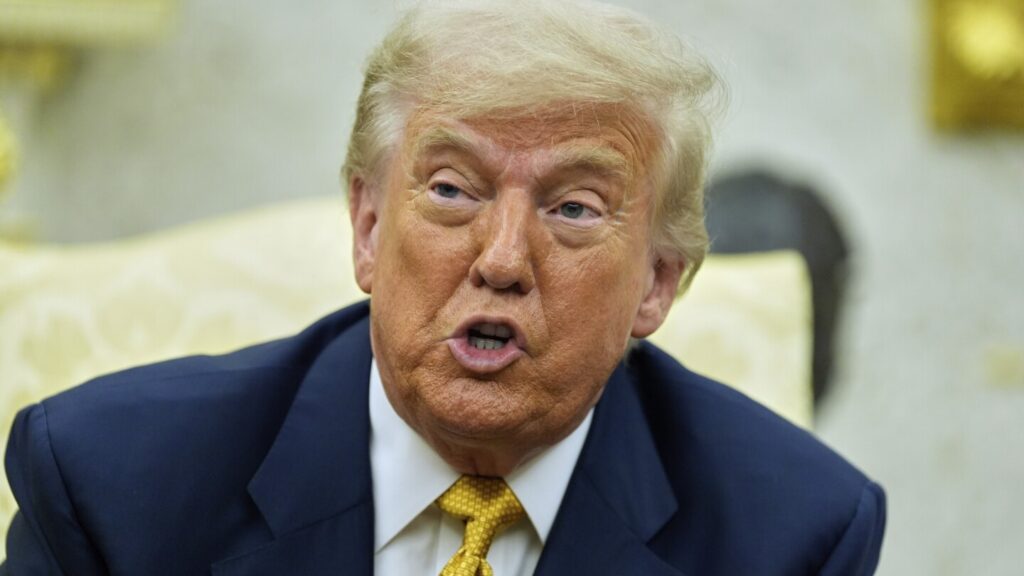A small but fast-growing group in the United States has soured somewhat on President Donald Trump this year, as they worry about high costs and fear that new tariff policies will further raise their personal expenses, a new poll finds.
The percentage of Asian Americans, Native Hawaiians and Pacific Islanders with an unfavorable opinion of Trump rose to 71% in July, from 60% in December, according to a national survey by AAPI Data and The Associated Press-NORC Center for Public Affairs Research.
Notably, AAPI adults who describe themselves as independent are especially likely to have cooled on the president. About 7 in 10 AAPI independents have a “very” or “somewhat” unfavorable opinion of Trump, up roughly 20 percentage points since December.
The poll is part of an ongoing project exploring the views of Asian Americans, Native Hawaiians and Pacific Islanders, whose views are usually not highlighted in other surveys because of small sample sizes and lack of linguistic representation.
AAPI independents’ unfavorable view of Trump is higher than his unfavorable rating among independent adults overall, which was 52% in a June AP-NORC poll, having nudged slightly higher from 44% in December.
Economic concerns could be playing a central role. About 8 in 10 AAPI adults expect Trump’s tariff policies will increase the cost of consumer goods, the poll found, while only about 4 in 10 think those policies will boost domestic manufacturing and just 2 in 10 anticipate more U.S. jobs as a result.
“To me, it seems like a lot of not-really-well-thought-out things that are happening,” said Michael Ida, a 56-year-old independent in Hawaii who teaches high school advanced-placement calculus. “In the process, there’s a lot of collateral damage and fallout that’s hurting a lot of people.” Ida was referring specifically to government spending cuts, including for education.
AAPI adults represent a small segment of the U.S. population, making up about 7% of the nation’s residents in 2023, according to a Pew Research Center analysis of government data. Likewise, they are hardly a pro-Trump voting bloc generally. In last year’s election, English-speaking Asian U.S. voters shifted slightly toward Trump, but with only about a third supporting him, up from 29% in 2020, according to AP VoteCast.
The new poll also suggests that they are especially likely to be worried about the economy’s trajectory, and remain anxious about high costs.
About two-thirds of AAPI adults, 65%, say they are “extremely” or “very” concerned about the possibility of the U.S. economy going into a recession, higher than the 53% of the Americans generally who said the same in an April AP-NORC survey.
“On the economy, you saw AAPI voters shift — not in a big way, but shift nonetheless — toward Trump” in the 2024 election, said Karthick Ramakrishnan, executive director of AAPI Data and researcher at the University of California, Berkeley. “They are not seeing big economic benefits pan out. Quite the contrary, they are seeing big economic risks on the horizon based on Trump’s action on tariffs.”
Shopan Hafiz, a 39-year-old independent and engineer at Intel in Oregon, described his view of Trump as “very unfavorable,” and bemoaned the Republican president’s tariff policy which he expected to hit American consumers harder in the coming months.
“With all the tariffs, I don’t think it’s going to help,” Hafiz said. “All the tariffs will ultimately be paid by U.S. nationals, and inflation is going to get worse.”
The poll comes in the midst of Trump’s on-and-off threats to impose tariffs for what he says is his goal of leveling the nation’s trade imbalance. Inflation rose in June to its highest level since February as Trump’s tariffs pushed up the cost of household goods, from groceries to appliances.
Consumer prices rose 2.7% in June from a year earlier, the Labor Department said last week, up from an annual increase of 2.4% in May. On a monthly basis, prices climbed 0.3% from May to June, after rising just 0.1% the previous month.
Like Hafiz, Ida, the teacher in Hawaii, did not vote for Trump last year. Instead, both voted for Libertarian Party nominee Chase Oliver. Hafiz’s decision was in opposition to the two major U.S. parties’ support for Israel in its war in Gaza. Ida said the two major parties had become “too extreme.”
Ida is among the roughly two-thirds of AAPI adults who say they are at least “very concerned” about the cost of groceries. He’s noticed fear of higher prices in his Pacific island state, and even more within the ethnic businesses, in light of Hawaii’s reliance on shipped goods.
“Here in Hawaii, because we’re so isolated, everything comes on a ship or a plane,” he said. “We’re especially vulnerable to prices rising and disruptions in the supply chain. There’s definitely some anxiety there.”
___
The poll of 1,130 U.S. adults who are Asian American, Native Hawaiian and Pacific Islanders was conducted June 3-11, 2025, using a sample drawn from NORC’s probability-based Amplify AAPI Panel, designed to be representative of the Asian American, Native Hawaiian, and Pacific Islander population. Online and telephone interviews were offered in English, the Chinese dialects of Mandarin and Cantonese, Vietnamese and Korean. The margin of sampling error for all respondents is plus or minus 4.7 percentage points.


